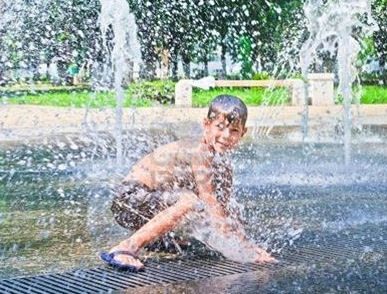If a heat wave is forecast or happening:
-Avoid strenuous activity. If you must do strenuous activity, do it during the coolest
part of the day, which is typically between 4:00 a.m. and 7:00 a.m.
-Stay indoors as much as possible. If air conditioning is not available, stay on the
lowest floor, out of the sunshine. Remember, electric fans do not cool the air, but
they do help sweat evaporate, which cools your body.
-Wear lightweight, light-colored clothing.
-Drink plenty of water regularly and often. Your body needs water to keep cool. Water is the safest liquid
to drink during heat emergencies. Avoid drinks with alcohol or caffeine; this is especially true of beer,
which dehydrates the body.
Symptoms of heat emergencies:
-Heat exhaustion: Cool, moist, pale, or
flushed skin; heavy sweating;
headache; nausea or vomiting;
dizziness; and exhaustion. Body
temperature will be near normal.
-Heat stroke: Hot, red skin; changes in
consciousness; rapid, weak pulse;
and rapid, shallow breathing. Body
temperature can be very high– as
high as 105 degrees F. If the person
was sweating from heavy work or
exercise, skin may be wet;
otherwise, it will feel dry.
Treatment of heat emergencies:
-Heat exhaustion: Get the person out of the heat and into a cooler place. Remove or loosen tight clothing
and apply cool, wet cloths, such as towels or sheets. If the person is conscious, give cool water to
drink. Give a half glass of cool water every 15 minutes. Do not give liquids that contain alcohol or
caffeine. Let the victim rest in a comfortable position, and watch carefully for changes in his or her
condition.
-Heat stroke: Heat stroke is a life-threatening situation. Help is needed fast. Call 9-1-1 and move the
person to a cooler place. Immerse victim in a cool bath, or wrap wet sheets around the body and fan
it. Watch for signals of breathing problems. Keep the person lying down and continue to cool the body
any way you can. If the victim refuses water or is vomiting or there are changes in the level of
consciousness, do not give anything to eat or drink.
F 094 05-08
Hot weather terms to know…
-Heat wave: Prolonged period of excessive heat and humidity.
-Heat index: A number in degrees Fahrenheit (F) that tells how
hot it really feels when relative humidity is factored into the
actual air temperature. Exposure to full sunshine can increase
the heat index by 15 degrees F.
-Heat exhaustion: Heat exhaustion typically occurs when people
exercise heavily or work in a hot, humid place where body
fluids are lost through heavy sweating. Blood flow to the skin
increases, causing blood flow to decrease to the vital organs,
which results in a form of mild shock. If not treated, the
victim may suffer heat stroke.
-Heat stroke/sunstroke: Heat stroke is life-threatening. The body
temperature can rise so high that brain damage and death
may result if the body is not cooled quickly.
Tagged With: auto insurance, friendly insurance agency, heat waves tips, helpful insurance tips, home insurance, home insurance agency, how to avoid the heat, insurance, insurance solutions, lake ronkonkoma insurance agency, local insurance agency, peronsal insurance, renters insurance, ronkonkoma insurance agency, safety tips, summer safety, tips for staying cool

